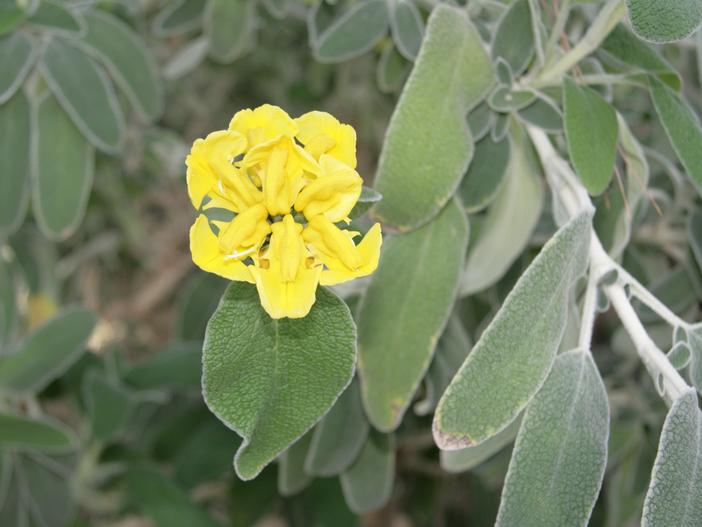Cretan Jerusalem Sage
(Phlomis cretica)
Cretan Jerusalem Sage (Phlomis cretica)
/
/

Christer T Johansson
CC BY 3.0
Image By:
Christer T Johansson
Recorded By:
Copyright:
CC BY 3.0
Copyright Notice:
Photo by: Christer T Johansson | License Type: CC BY 3.0 | License URL: https://creativecommons.org/licenses/by/3.0 | Uploader: Christer T Johansson | Publisher: Wikipedia Commons






Estimated Native Range
Summary
Phlomis cretica, commonly known as Cretan Jerusalem Sage, is an evergreen shrub native to the Mediterranean region, particularly the island of Crete and other parts of Southeast Europe. It typically grows to a height and width of 2 feet (0.6 meters), forming a compact, rounded shape. The plant is characterized by its woolly, heart-shaped leaves and whorls of tubular yellow flowers that bloom in the spring, providing a showy display that attracts pollinators. The bark is not particularly notable, but the plant’s overall texture adds interest to the garden throughout the year.
Cretan Jerusalem Sage is valued for its drought tolerance and ability to thrive in poor soils, making it an excellent choice for water-wise gardens and xeriscaping. It is often used in rock gardens, Mediterranean-style landscapes, and as a border plant. Gardeners appreciate its low maintenance requirements and resistance to deer browsing. It prefers well-drained soils and can tolerate a range of conditions from full sun to part shade. While generally disease-resistant, it can be susceptible to root rot in overly wet conditions. There are no widely recognized cultivars of this species in the horticultural trade, but its natural form is well-suited to cultivation in appropriate climates.CC BY-SA 4.0
Cretan Jerusalem Sage is valued for its drought tolerance and ability to thrive in poor soils, making it an excellent choice for water-wise gardens and xeriscaping. It is often used in rock gardens, Mediterranean-style landscapes, and as a border plant. Gardeners appreciate its low maintenance requirements and resistance to deer browsing. It prefers well-drained soils and can tolerate a range of conditions from full sun to part shade. While generally disease-resistant, it can be susceptible to root rot in overly wet conditions. There are no widely recognized cultivars of this species in the horticultural trade, but its natural form is well-suited to cultivation in appropriate climates.CC BY-SA 4.0
Plant Description
- Plant Type: Shrub
- Height: 1.5-3 feet
- Width: 1-1.5 feet
- Growth Rate: Moderate
- Flower Color: Yellow
- Flowering Season: Spring
- Leaf Retention: Evergreen
Growth Requirements
- Sun: Full Sun, Part Shade
- Water: Low, Medium
- Drainage: Medium, Fast
Common Uses
Bee Garden, Bird Garden, Butterfly Garden, Deer Resistant, Low Maintenance
Natural Habitat
Native to the Mediterranean region, particularly the island of Crete and other parts of Southeast Europe
Other Names
Common Names:
Scientific Names: , Phlomis cretica, Phlomis ferruginea var. cretica,
GBIF Accepted Name: Phlomis cretica C.Presl